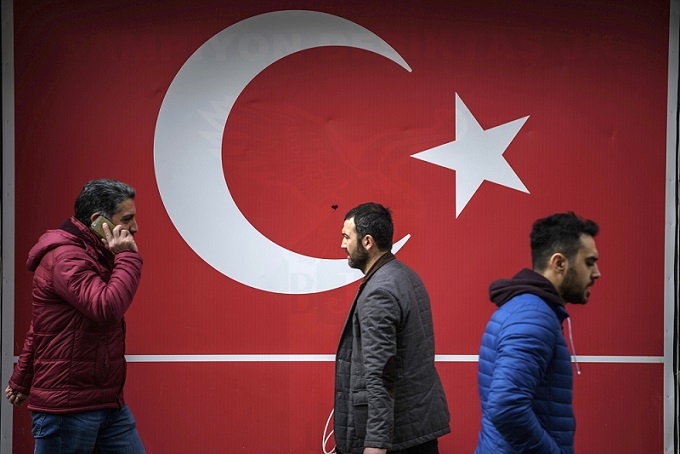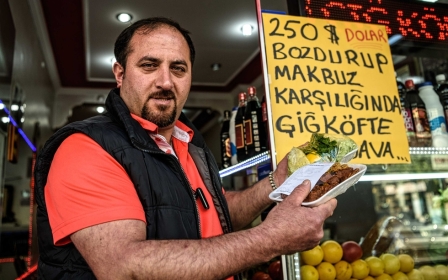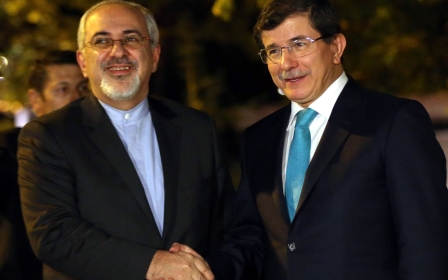Turkey's economic turn to the East

While Turkey’s fraying links with the West, particularly NATO and the EU, have attracted a lot of attention, the fact that growing economic pressures are pushing the country towards an alternative eastern-oriented underpinning to its economy has attracted less attention. Turkey has belonged to the Western economic and financial system since the 1950s, but in Ankara, the search is on for alternatives.
The trigger for this change is the buffeting of the Turkish lira (TL), down against the dollar by 18 percent this autumn and 8 percent in the past month. This Wednesday, a rise in US interest rates sent the TL sliding down again. As a result, it is already clear that 2017 will be a very difficult year for Turkey's economy.
READ MORE: Turkey's economic crisis: Free kebabs, haircuts and gravestones
Are there alternatives to reliance on the dollar? One response is to look east and cut out the Western financial system. Last week, Turkey announced that it plans to trade with Russia, China, and Iran in local currencies rather than denominate its deals with them in dollars. Energy deals will be denominated in Turkish liras, meaning that Russia, Turkey’s chief energy supplier, will have increased incentives to purchase Turkish goods.
Ties with China, Russia
The change in economic relations with China is particularly striking. Traditionally, China has never been a major presence on the Turkish business scene, but that could now change. On 9 December, Turkey and China announced that they had carried out their first lira-yuan swap deal for TL 450m ($132m). That creates an initial pool of the other’s currency in each country to be used in trade.
There are other signs that China-Turkey economic relations are about to gain impetus. China (which until recently discouraged its tourists from visiting Turkey this year on safety grounds) signed an agreement to send 1 million tourists annually. It has said it would consider Turkish membership of the Shanghai Cooperation Organization, seen by President Erdogan as an alternative to the EU and, since November, the two countries have been talking about ways to expand trade and bilateral cooperation.
The scale of China’s economy (bilateral trade totalled about $28bn in the second quarter of this year) makes it appealing as an alternative to Western markets. The Chinese tourism deal, for example, taken with a promised revival of Russian tourism, might help a badly stricken sector to recover in 2017.
The other plank of this policy is to get Turkish-Russian trade overall to recover. It shuddered to a halt a year ago after Turkey shot down a Russian jet. Political relations recovered last summer, but trade has not yet done so.
Pressure to be strong
Problems with the dollar apart, there are several reasons why Turkey is looking away from the West in economics.
There is growing distrust towards the US under President Obama and the apparently good standing still enjoyed there by the Gulen movement, the US-based religious brotherhood which even Erdogan’s political opponents overwhelmingly believe was mainly responsible for the attempted coup on 15 July this year in Turkey. Another is the final breakdown of Turkey’s bid to join the EU.
Meanwhile, pressures are mounting on a government committed to strong economic growth. In the third quarter of this year, GDP dropped by 1.8 percent, its first fall for several years. The causes seem to be the shock effect of the attempted coup, the dislocation which followed, and the weak demand in the EU countries for Turkish imports.
The government’s determination to press the fast forward button for the economy is undiminished. Low interest rates encourage business and, specifically, the construction industry. TV advertisements tell consumers they can buy1 luxury homes on ultra-easy terms with little or no security. Other advertisements tell businessmen that they can get cheap bank loans effortlessly. In such a climate, savings languish, borrowing mounts.
Locking the chest, tossing the keys
On top of this, the government is waging expensive military campaigns and undertaking ambitious infrastructural and defence projects. It all creates a business environment highly vulnerable to short-term interest rate shocks.
Under huge public pressures, the Central Bank has obeyed frequently repeated messages from the politicians to hold rates down. Bank interest rates were raised steeply early in 2014 in a successful operation to strengthen the lira, but since then, they have been pruned at regular intervals.
At the most recent interest rate meeting on 24 November, though the lira had depreciated by 10 percent in the previous month, the Central Bank announced increases in interest rates of only 0.25 percent to 0.5 percent. It was the first rise in three years but obviously inadequate. The bank also announced that it will meet fewer times in the year to discuss rates.
To the Western business mind, this looks like locking the medicine chest and throwing the key away.
Return of the native?
That is not how things are seen in Ankara however. The talk in Ankara is of foreign speculators trying to bring down the economy, ‘economic sabotage’, and even an economic attempted coup.
Moving towards trading in ‘local currencies’, far-reaching though its effects might be, is a long term response. In the short term, the government has tried populist measures such as encouraging citizens to turn their holdings of foreign exchange into Turkish liras and told state agencies to turn their dollar holdings into liras, and convert contracts into lira wherever possible. None of this has rescued the TL so far
On 8 December, the prime minister, Binali Yildirim, announced measures to further stimulate business activity, including the creation of a TL250bn ($72bn) credit fund and other debt relief measures, all apparently to be financed out of public spending cuts – though probably not the big infrastructural and defence projects. This announcement promptly sent the lira down again on markets which wanted higher interest rates, not more credit growth.
So what is Turkey’s game plan? According to Murat Yetkin of the Hürriyet Daily News, others close to the government see the crisis as a way of shifting Turkey out of the Western world, by letting the stock market and links with the EU collapse, to be eventually replaced by ‘a more native economy’ with much stronger trading ties with Russia and China and the abandonment of the free movement of capital. Perhaps this fear is groundless but the current fierce language calms nobody.
- David Barchard has worked in Turkey as a journalist, consultant, and university teacher. He writes regularly on Turkish society, politics, and history, and is currently finishing a book on the Ottoman Empire in the 19th century.
The views expressed in this article belong to the author and do not necessarily reflect the editorial policy of Middle East Eye.
Photo: People walk next to a Turkish national flag at the historical grand bazaar on in December 2016 in Istanbul (AFP)
This article is available in French on Middle East Eye French edition.
Middle East Eye propose une couverture et une analyse indépendantes et incomparables du Moyen-Orient, de l’Afrique du Nord et d’autres régions du monde. Pour en savoir plus sur la reprise de ce contenu et les frais qui s’appliquent, veuillez remplir ce formulaire [en anglais]. Pour en savoir plus sur MEE, cliquez ici [en anglais].





